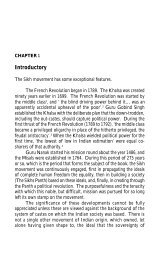The Sikh Turban: Post-911 Challenges to This Article of Faith
The Sikh Turban: Post-911 Challenges to This Article of Faith
The Sikh Turban: Post-911 Challenges to This Article of Faith
You also want an ePaper? Increase the reach of your titles
YUMPU automatically turns print PDFs into web optimized ePapers that Google loves.
constant nature <strong>of</strong> her appearance could have more <strong>of</strong> a proselytizing effect than she<br />
imagined, and therefore her <strong>Sikh</strong> regalia should not be permitted in schools. 320<br />
To those that doubt the weight <strong>of</strong> a State Supreme Court decision such as Cooper,<br />
it should be noted that the U.S. Court <strong>of</strong> Appeals for the Third Circuit relied on Cooper in<br />
1990, following the Supreme Court’s dismissal <strong>of</strong> the appeal, in reaching its analysis <strong>of</strong> a<br />
case brought by Muslim public school teacher under Title VII. 321 Accordingly, as one<br />
commenta<strong>to</strong>r noted, prevailing case law “suggest[s] that states can prohibit public school<br />
teachers from wearing religious garb in the interest <strong>of</strong> preserving religious neutrality<br />
without violating the free exercise rights <strong>of</strong> teachers as long as the prohibition applies<br />
equally <strong>to</strong> all religious dress and does not target or burden one religious group over<br />
others.” 322 It may not be surprising, then, that some argue that a ban on conspicuous<br />
articles <strong>of</strong> faith in public schools is “not completely unthinkable in the United States,”<br />
and that the religious rights <strong>of</strong> a turbaned <strong>Sikh</strong> public student after 9/11 are “tentative” at<br />
best. 323 In 1993, however, Congress passed the Religious Freedom Res<strong>to</strong>ration Act<br />
(RFRA), which was designed <strong>to</strong> reinstate the “compelling interest” Sherbert test for free<br />
exercise claims. 324 <strong>The</strong> RFRA states that the “Government shall not substantially burden<br />
a person’s exercise <strong>of</strong> religion even if the burden results from a rule <strong>of</strong> general<br />
applicability,” 325 unless the government demonstrated that the burden is “in furtherance<br />
<strong>of</strong> a compelling governmental interest” and “is the least restrictive means <strong>of</strong> furthering<br />
that compelling governmental interest.” 326 In 1997, the U.S. Supreme Court, in City <strong>of</strong><br />
320 Id. at 312-13. Interestingly, Cooper’s decision <strong>to</strong> manifest her faith at school could<br />
have been recognized by the court as an educational benefit, namely <strong>of</strong> teaching her<br />
students about the diversity <strong>of</strong> the society they inhabited and, as such, teaching them <strong>to</strong><br />
appreciate and respect those who may not appear <strong>to</strong> be the same as themselves. <strong>The</strong><br />
court, however, assumed that visible religious minorities that are active in their<br />
communities are in essence imposing their faith on others by simply adopting the<br />
symbols <strong>of</strong> their own personal beliefs.<br />
321 U.S. v. Bd. <strong>of</strong> Educ. for Sch. Dist. <strong>of</strong> Philadelphia, <strong>911</strong> F.2d 882, 884 (3d Cir. 1990).<br />
322 Walterick, supra note 251, at 267.<br />
323 Id. at 269. See also Elliot Taubman, Headscarves, Skullcaps and Crosses: Does<br />
Banning Religious Symbols in Public Schools Deny Human Rights? 53-Jun R.I. B.J. 9, 34<br />
(2005) (“Even with a compelling interest test, when applied in a public school context,<br />
with at least equality <strong>of</strong> treatment <strong>of</strong> all religions, then Justice Scalia may say that taking<br />
the entire balance in<strong>to</strong> account, there is a legitimate basis for a ban on obvious religious<br />
symbolism.”).<br />
324 City <strong>of</strong> Boerne v. Flores, 521 U.S. 507, 515 (1999).<br />
325 42 U.S.C.A. §2000bb-1(a).<br />
326 42 U.S.C.A. §2000bb-1(b).<br />
56
















